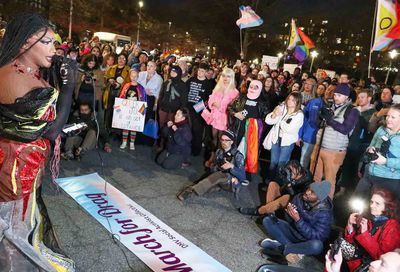Prison Guideline Grudge
Activist faults transgender guidelines
Jeri Hughes, a member of D.C. Trans Coalition, on June 12 fired the latest shot in an ongoing melee between the D.C. Department of Corrections (DOC) and local transgender activists. Her official complaint, filed last week, takes issue with both the DOC’s most recent directive regarding the intake and accommodation of transgender and androgynous inmates in D.C. jails, as well as a perception that the transgender community was not adequately consulted before the directive was drafted.
That directive is the Gender Housing and Classification Memorandum, dated May 10, which Hughes says she spotted on the D.C. Inspector General’s Web site two weeks ago.
”The DOC got together with the Office of Human Rights and the general counsel, and came up with their own solution which was recently published… without even informing the Trans Coalition or anyone,” Hughes says.
There was an initial meeting in March, however, between the DOC and the D.C. Trans Coalition to address the issue. That meeting stemmed, in part, from a July 2007 incident in which an androgynous woman was placed in a male facility despite her pleas to be moved. Three corrections officers were later fired as a result.
Another precursor to that initial meeting was local transgender activist Ruby Corado’s own arrest for simple assault earlier in March. At the time, Corado threatened to file a class-action lawsuit against the DOC, claiming that she was forced to submit to a strip search in front of male inmates.
With the May 10 memorandum and the June 12 complaint, it does not seem that the schism between the DOC and the local transgender community will be mended anytime soon.
While Hughes is critical of the transgender community’s seeming absence in the DOC guidelines process — although the city’s Office of Human Rights and Office of LGBT Affairs did reportedly offer input — the memorandum itself includes language that will likely add fuel to the fire.
The memorandum states: ”DOC shall classify an inmate who has male genitals as a male and one who has female genitals as a female, regardless of the individual’s gender expression.”
Prison placement, therefore, is not dependent upon a person’s gender expression. The memorandum adds that accommodations will be made, however, to respect gender expression.
”[I]nmates under hormone therapy with secondary sexual characteristics such as breasts shall be provided with appropriate undergarments such as a bra when clinically indicated by appropriate medical staff.” Hormone therapy will also be provided, when deemed appropriate by medical staff. Further, ”protective custody” may be offered to segregate transgender or androgynous inmates.
Peter J. Nickles, interim attorney general, wrote May 13 that the DOC’s May 10 memo pertaining to Gender Classification and Housing was ”promulgated by DOC after extensive consultation with the Office of Human Rights, the Office of LGBT Affairs,” and others.
”It is consistent and compliant with the District’s human rights laws and regulations,” Nickles stated.
Hughes insists, however, that it is not. ”I was angry and upset when I read [the memorandum],” she says.
When speaking to Metro Weekly, Anthony Diallo, public affairs specialist for the DOC, said the DOC ”has no comment” regarding the matter. Beverly Young, a spokesperson for the DOC, did confirm, however that the May 10 document is the final version of the memorandum.
Adds Hughes: ”I don’t believe that [the officials involved] are bad. I think they’re all good people. But you can be good and still be blind to another person’s perspective. The bottom line is they just don’t understand the transgender perspective.
”If they were to go back and rewrite it and say, ‘Each individual is going to be assessed and put in the most appropriate setting,’ what’s wrong with that?”
Support Metro Weekly’s Journalism
These are challenging times for news organizations. And yet it’s crucial we stay active and provide vital resources and information to both our local readers and the world. So won’t you please take a moment and consider supporting Metro Weekly with a membership? For as little as $5 a month, you can help ensure Metro Weekly magazine and MetroWeekly.com remain free, viable resources as we provide the best, most diverse, culturally-resonant LGBTQ coverage in both the D.C. region and around the world. Memberships come with exclusive perks and discounts, your own personal digital delivery of each week’s magazine (and an archive), access to our Member's Lounge when it launches this fall, and exclusive members-only items like Metro Weekly Membership Mugs and Tote Bags! Check out all our membership levels here and please join us today!





















